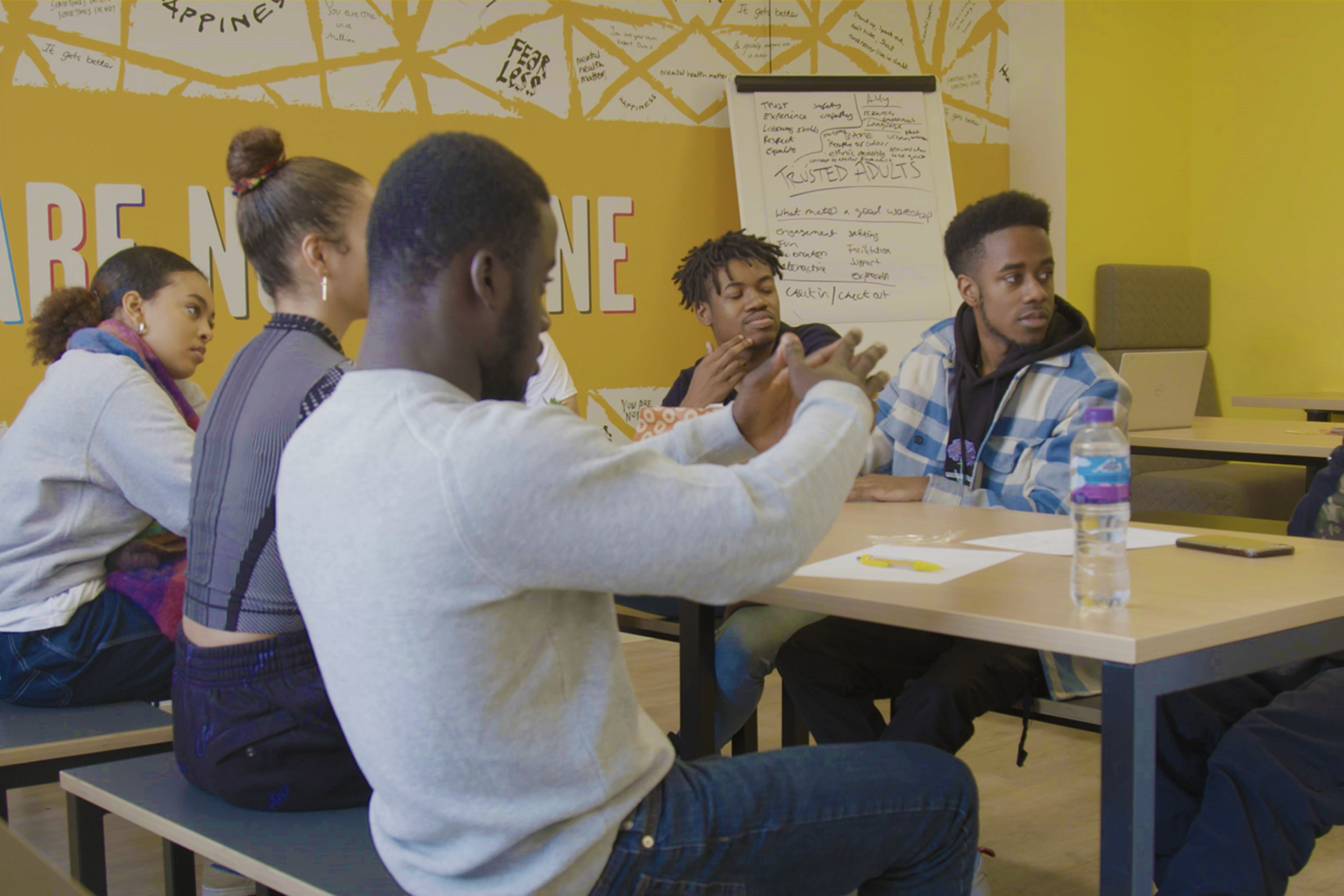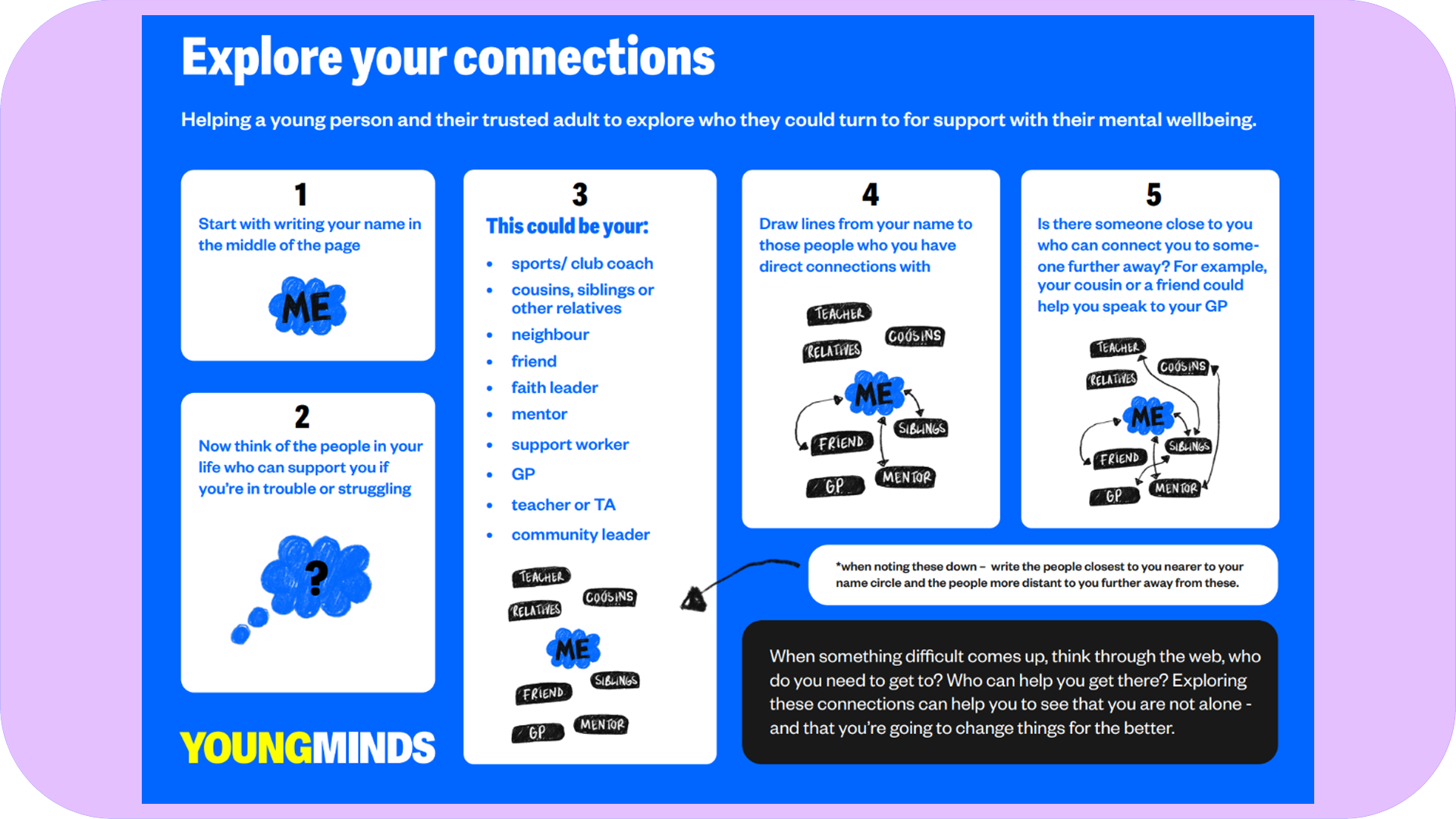
- For:
- Schools,
- Community support,
- Youth workers
We collaborated with Ambitious About Autism to facilitate a workshop with young people that explored how adults can support them with their mental health. Find out more about what young people told us and their advice for how you can support them.

Autism is a developmental condition that affects how you see the world and how you interact with other people. It is not a mental health problem.
Just like anyone else, autistic people can have good mental health. However, people with autism can often experience mental health problems. According to Autistica, seven out of ten autistic people have a mental health condition such as anxiety, depression or OCD.
Autism is a spectrum condition, which means it affects people in very different ways.
An autistic person may experience things differently to non-autistic people. For example, they may:
An autistic person may need some help understanding non-autistic people’s behaviour and language. For example, sarcasm or metaphorical phrases like ‘once in a blue moon’.
An autistic person might find bright lights, loud noises or strong smells overwhelming.
An autistic person may find repetitive activities and routine comforting, and find new situations and changes difficult to cope with. They may need some support to help know what to expect.
We want to help the adults in a young person’s life to understand some of their experiences and be more confident in supporting their mental health.
That’s why we asked Ambitious About Autism to help us explore with young people the following topic:
Find out below what we discovered.

We had a team of young people feed into this work and each one had different needs and preferences. Don’t assume what an autistic young person will need; get to know them and decide together while keeping this general information in mind.
We explored what things can have a positive and negative impact on an autistic person’s mental health.
Joy can be having consistent and safe people around, and a supportive network of family and friends.
A structured routine, or access to safe spaces when feeling overwhelmed can be positive for some young people.
Having a special interest can bring happiness and comfort.
Unexpected changes or a lack of routine can create feelings of anxiety.
Having difficulty making or keeping friends can be isolating and lonely.
Masking in school or with friends can lead to burnout.

Loneliness was mentioned repeatedly.
A lot of community activities have an opportunity to tackle this. Making your community activity accessible and supportive for autistic young people is one clear way you can help build positive mental wellbeing.
We asked the following question to autistic young people:
What one thing should trusted adults do to support the mental health of autistic young people?
Here’s what they said:
Build trust by making sure to use literal language and avoid lying to autistic people even if that would make things easier for you.
Simply listen when we speak and do not act judgemental.
It can take time to fully express and convey emotions and it’s important that a trusted adult takes the time to understand and not jump to conclusions or make judgments. Feeling misunderstood could lead an autistic young person to feeling like they can’t reach out for support in the future, further creating [a] barrier.
Take time to know what activities and hobbies your young people enjoy and respond positively to.
What works for one autistic young person may not work for another autistic young person. There aren't perfect one-size-fits all guidelines to follow for us, just the same as their aren't for our non-autistic peers. Be patient and encourage us to keep trying until we can find coping skills that work for us.
Every autistic young person has different sensory needs and requirements, and just because one person has a certain trigger or sensory need, that doesn’t mean everyone is the same. It is important to make an environment comfortable and welcoming for autistic young people, ensuring that everyone’s sensory needs are met.
Understand the anxiety caused by social interactions and the energy it takes to socialise with other people, especially strangers.
Young people said having a plan with the adults in their lives is important. It means adults know the best way to support them if they’re in crisis. Creating a plan allows the young person to let you know all the ways you can help them, and the things that are not helpful for them in a crisis situation.
Allow plenty of time to create this plan together, and make sure that it can be changed based on the preferences of the young person.
If you are worried that a young person is at immediate risk of harm, or is not safe, call 999 or take them to A&E. The NHS is very clear that a mental health emergency should be taken as seriously as a physical one, and that you will not be wasting anyone’s time.
You can also contact your local NHS urgent mental health helpline (England only) or call 111 for 24-hour advice and support.
You may find it helpful to reflect on this advice and think about some of the things you can do in your role to best support the young autistic people you work with.
Consider the following questions:
Consider the following questions:
Take a look at some of our resources that can help support you to talk to young people about their mental health.

Our connections activity can help you open up conversations about the other adults in a young person's life and consider who else might be able to offer support. Talk through the benefits that may come from reaching out, and let the young person share the risks/fears they have. This will help you have a better understanding of the young person's situation and feelings.
Document type: PDF
Document size: <1MB

This page was created in April 2024.
It was co-created with professionals with experience of supporting autistic young people and their mental health.
We will next review the page in 2027.
YoungMinds is a proud member of PIF TICK – the UK's quality mark for trusted health information.
Whether you love the page or think something is missing, we appreciate your feedback. It all helps us to support more young people with their mental health.
Please be aware that this form isn’t a mental health support service. If you or a young person you work with is in crisis right now and wants to talk to someone urgently, find out who to contact on our urgent help page.
At YoungMinds we take your privacy seriously. If you’d like to read more about how we keep the information we collect safe, take a look at our privacy policy.